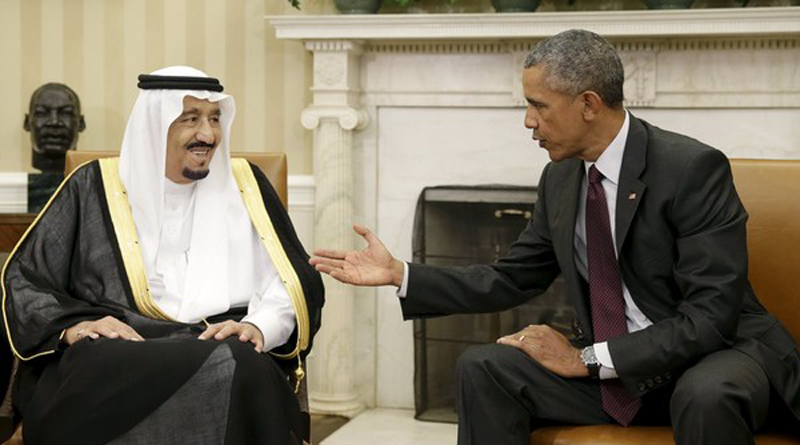by Maye Kabil
In his first visit to the United States since ascending to the throne last January, economy was on the agenda of the Saudi King Salman, but his main concerns were more about politics and security in the Middle East.
King Salman met with US President Barack Obama at the White House on Friday to seek more support in countering Iran, especially after the recent nuclear deal.
The US-Saudi relationship has suffered strain because of what Riyadh sees as Obama’s withdrawal from the region, a lack of direct US action against President Bashar al-Assad of Syria, and a perceived US tilt towards Iran since the 2011 Arab uprisings.
Still, both countries share many strategic objectives and depend on each other in a number of core security, economic, and political issues.
After the meeting between Obama and Salman, Saudi Foreign Minister Adel al-Jubeir said Obama had assured the Saudi king that the agreement prevents Iran from acquiring a nuclear weapon, and that it includes inspections of military and suspicious sites, and has a provision re-implementing sanctions if Iran violates the agreement.
Under those conditions, al-Jubeir said, Saudi Arabia supported the deal.
“Now we have one less problem for the time being to deal with, with regards to Iran,” al-Jubeir said. “We can now focus more intensely on the nefarious activities that Iran is engaged in the region.”
Gulf Arab states had previously expressed their support for the Iran nuclear deal, but fear that the lifting of sanctions on Iran would enable it to pursue destabilising policies in the Middle East.
Critics say the nuclear deal will empower Iran economically to increase its support of militant groups in the region. But the Obama administration also has its concerns about Saudi actions in the region, according to the Christian Science Monitor. One is that the Saudis are using their go-it-alone approach to Syria to offer support to Islamist rebel groups that the US considers too extreme. Another is that the Saudi intervention in Yemen is deepening a conflict that is adding another humanitarian crisis to the region and giving the Yemeni branch of Al Qaeda wider freedom of action.
Saudi Arabia and Iran are opposed on a number of regional issues, especially the four 1/2-year-long Syrian civil war and unrest in Yemen, where a coalition of Arab states led by Riyadh and assisted by the United States are targeting Iran-allied Houthi forces.
Obama said on Friday that he and Salman share concerns about Yemen and the need to restore a functioning government and address the humanitarian situation there.
US Deputy National Security Adviser Ben Rhodes said ahead of Salman’s visit that the United States believed more care needs to be taken to avoid civilian casualties in the air strikes against Houthi forces in Yemen.
Al-Jubeir said on Friday that the humanitarian crisis in Yemen was being exacerbated by the Houthis and that supplies were at risk of being diverted from Yemenis who need them most, but that Saudi Arabia was working with international organisations to send supplies to Yemen.
A Saudi-led coalition has been conducting air strikes across Yemen against Iranian-allied Houthi forces since March, pushing back Houthi forces but drawing criticism from international aid and rights groups for a mounting civilian death toll.
Saudi Defense Minister Mohammed bin Salman also met on Friday with U.S. Secretary of Defense Ash Carter and the two discussed Saudi Arabia’s underlying defence requirements, the Pentagon said.
Saudi Arabia remains the world’s largest oil exporter, and its commitment to pumping oil freely despite a recent price decline has helped contribute to sustaining the U.S. economic recovery. Obama and Salman will discuss the world economy and energy issues, Obama told reporters on Friday.
Saudi Arabia has also joined the United States and other Arab states in air strikes against the Islamic State jihadist movement in Syria, also called ISIL.
“We continue to cooperate extremely closely in countering terrorist activities in the region and around the world, including the battle against ISIL,” Obama said on Friday.
Obama and Salman discussed the potential fast-tracking of the release of American military technology and weapons systems to Saudi Arabia, al-Jubeir said, and discussed a “new strategic partnership” between the two countries, although he gave few details.
Senior administration officials told the New York Times that the Pentagon was finalising a $1bn arms agreement that would provide weapons for the Saudi military for the campaign against the jihadist group Islamic State and the Houthi rebel movement in Yemen.
The deal primarily comprised missiles for US-made F-15 fighter jets, the officials said.


